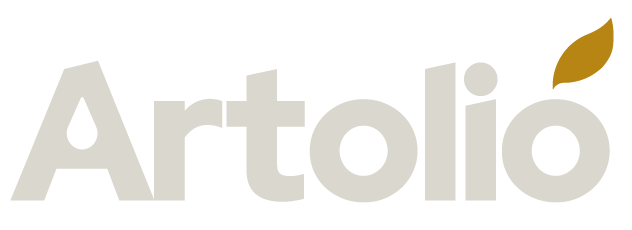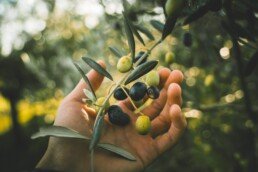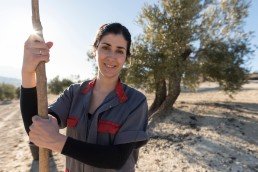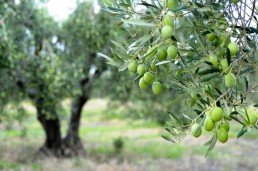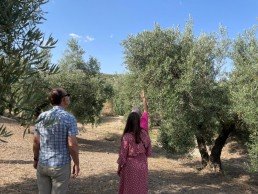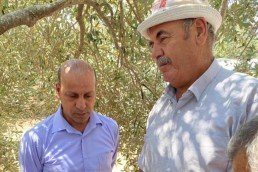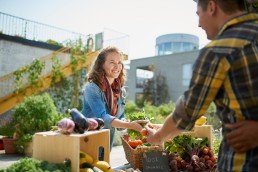The International Olive Council (IOC) is currently inviting applications for scholarships related to the International Expert Course in Virgin Olive Oil Tasting.
The International Olive Council (IOC) is currently inviting applications for scholarships related to the International Expert Course in Virgin Olive Oil Tasting.
This educational opportunity is being hosted by the University of Jaén in Spain and aims to advance technology transfer to improve participants' tasting abilities. It focuses on imparting foundational knowledge about the sensory evaluation of virgin olive oil, its methodology, and the association between olive oil's organoleptic traits and its cultivation and extraction methods, alongside various physical and chemical quality control standards.
This call is open to professionals from countries that are members of the IOC, who have a minimum of five years' experience working in olive oil mills, quality control of olive oil, or in the research and development of olive oil. Applicants should also have a basic educational qualification. The course is scheduled to run from the 25th of September to the 19th of December, 2024, in Jaén, Spain.
Interested individuals must submit their scholarship applications by the 7th of April, 2024.
For additional details about the course, the scholarships offered by the IOC (including principles, exclusions, selection, and award criteria), and the application process, more information can be found HERE.
Attached for further reference is the brochure: Triptych_Olive_March_2024.
Source:
https://www.internationaloliveoil.org/applications-for-scholarships-for-the-international-expert-course-in-virgin-olive-oil-tasting/
Celebrate Olive Oil Excellence and Sustainability at the Final ARTOLIO ENI CBC MED Meeting in Barcelona!
 Save the Date: Celebrate Olive Oil Excellence and Sustainability at the Final ARTOLIO ENI CBC MED Meeting in Barcelona!
Save the Date: Celebrate Olive Oil Excellence and Sustainability at the Final ARTOLIO ENI CBC MED Meeting in Barcelona!
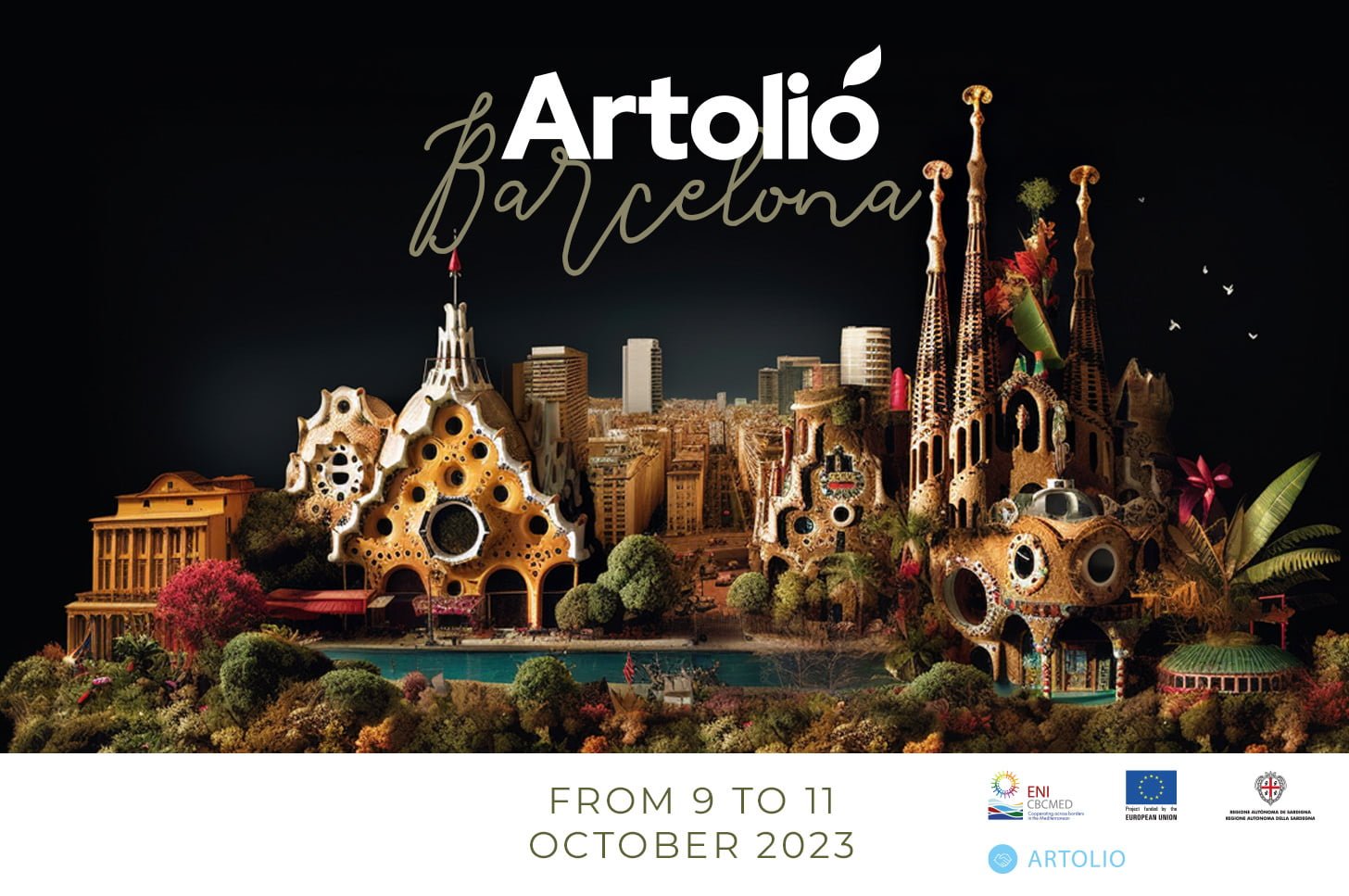
 What to Expect?
What to Expect?
 ARTOLIO Platform
ARTOLIO Platform
 Special Highlights
Special Highlights
 Agenda Snapshot
Agenda Snapshot
 Venue: Petit Palace Museum, Barcelona
Venue: Petit Palace Museum, Barcelona
 If you are a producer, book your place on our platform today and become part of the history of olive oil!
If you are a producer, book your place on our platform today and become part of the history of olive oil! 
AgroInfluencers: The Emerging Voices in the Agricultural Landscape
AgroInfluencers: The Emerging Voices in the Agricultural Landscape
In the digital age, 'influencers' are transforming every sector, from fashion and food to travel and fitness. In the agriculture sector, a new breed of influencers known as 'agroinfluencers' are stepping into the limelight. These modern farmers, agricultural students, and farming enthusiasts use social media to share their daily lives, insights, and knowledge about agriculture, inspire others, and reshape the perception of rural life.
1. Understanding AgroInfluencers
An agroinfluencer is an individual with the ability to influence others' perceptions, opinions, and decisions related to agriculture and rural life. They are typically young farmers, agricultural engineers, veterinarians, forestry workers, and other professionals in the agriculture sector. They leverage social media platforms to share their work and lifestyle in the countryside.
Their influence extends beyond their immediate followers. They engage with agricultural machinery companies, agricultural brands, and even government institutions. Their content ranges from practical farming tips, educational information about agricultural practices, to personal narratives about rural life.
1.1 The Rise of AgroInfluencers
The rise of agroinfluencers is largely attributed to the digital revolution and the growing popularity of social media platforms. As of January 2023, there were 5.16 billion internet users worldwide, representing 64.4% of the global population. Of these, 4.76 billion, or 59.4% of the global population, are social media users.
The proliferation of social media platforms has provided an avenue for individuals to share their thoughts, experiences, information, ideas, and opinions with a broad audience. This is particularly beneficial for individuals looking to establish their personal brand or business. Social media platforms offer a platform to reach a wider audience and build an online community.
In the agriculture sector, the use of social media has been on the rise. Farmers and agricultural professionals have discovered the numerous benefits these platforms offer, such as connecting with other farmers and promoting their products.
2. The Role of AgroInfluencers
Agroinfluencers play a crucial role in the agriculture sector. They serve as a bridge between the rural and urban worlds, shedding light on the realities of farming and rural life. They also help break down stereotypes about agriculture and rural areas, providing a more realistic and nuanced perspective.
2.1 Educating the Public
One of the primary roles of agroinfluencers is to educate the public about agriculture and rural life. They share their knowledge about various agricultural practices, including crop cultivation, livestock rearing, and agroforestry. They also discuss the challenges and opportunities in agriculture, providing valuable insights for both farmers and non-farmers alike.
2.2 Advocacy for Sustainable Practices
Many agroinfluencers are strong advocates for sustainable agricultural practices. They promote methods that enhance agricultural productivity while minimizing negative environmental impacts. They also highlight the importance of biodiversity conservation, soil health, and water conservation in agriculture.
2.3 Marketing and Promotion
Agroinfluencers often collaborate with agricultural brands and companies for marketing and promotion. They might use their platform to showcase a particular agricultural product, demonstrate its usage, or share their personal experiences with it. They can effectively increase the visibility of these brands and products, reaching a wider audience than traditional advertising methods.
3. The Impact of AgroInfluencers
Agroinfluencers have a significant impact on the agriculture sector and beyond. They can shape public opinion, influence consumer behavior, and even affect policy decisions.
3.1 Shaping Public Opinion
Agroinfluencers can significantly shape public opinion about agriculture and rural life. By sharing their experiences and insights, they can challenge common stereotypes, dispel misconceptions, and provide a more accurate portrayal of farming and rural life. This can lead to increased appreciation and support for farmers and the agricultural sector.
3.2 Influencing Consumer Behavior
Agroinfluencers can also influence consumer behavior. For example, they can promote local and sustainably produced agricultural products, influencing consumers to make more environmentally-friendly purchasing decisions. They can also raise awareness about issues such as food waste and food security, prompting consumers to adopt more responsible consumption habits.
4. Some of our female AgroInfluencers
There are numerous agroinfluencers making significant contributions to the agriculture sector. Here are some noteworthy examples:
4.1 Cristina Stribacu
 Cristina Stribakou is the founder of the LIÁ Premium Olive Oil company, known for its award-winning extra virgin olive oil produced in the olive groves owned by LIÁ Cultivators in Messinia, Greece. Cristina studied Art History and Italian, and when her entrepreneurial spirit faced the challenge of implementing sustainable and environmentally friendly practices on her farm, she was fully committed. She is a passionate, dedicated and forward-looking professional whose aim is to provide high-quality services and offer LIÁ premium extra virgin olive oil, a world-class product, with respect for authenticity and nature.
Cristina Stribakou is the founder of the LIÁ Premium Olive Oil company, known for its award-winning extra virgin olive oil produced in the olive groves owned by LIÁ Cultivators in Messinia, Greece. Cristina studied Art History and Italian, and when her entrepreneurial spirit faced the challenge of implementing sustainable and environmentally friendly practices on her farm, she was fully committed. She is a passionate, dedicated and forward-looking professional whose aim is to provide high-quality services and offer LIÁ premium extra virgin olive oil, a world-class product, with respect for authenticity and nature.
https://www.instagram.com/cristina_stribacu
https://www.linkedin.com/in/cristinastribacu/?originalSubdomain=gr
4.2 Ayala Noy Meir
 Ayala Noy Meir is a leading agronomist with a master's degree from the Hebrew University of Jerusalem. She has specialised in the field of olive oils, being a professional taster and leading the panel of the International Olive Oil Council.
Ayala Noy Meir is a leading agronomist with a master's degree from the Hebrew University of Jerusalem. She has specialised in the field of olive oils, being a professional taster and leading the panel of the International Olive Oil Council.
In addition to her academic role, Noy Meir is the Manager of the "Rish Lakish" organic olive oil mill. In this role, she oversees the cultivation of over 100 acres of organic olive trees, with a diversity of 8 varieties.
His experience and expertise has also extended to teaching, being a lecturer on olive oil at various forums. Ayala Noy Meir also brings her experience as a quality consultant to olive oil producers in Israel.
Her reputation and skills have made her a highly regarded judge in national and international olive oil competitions. In short, Ayala Noy Meir is a professional with a deep passion for excellence in olive oil, dedicated to quality and to the promotion of organic and sustainable practices.
https://www.instagram.com/noymeirayala
https://www.linkedin.com/in/ayala-noy-meir-
4.3 Emilie Borel Berta
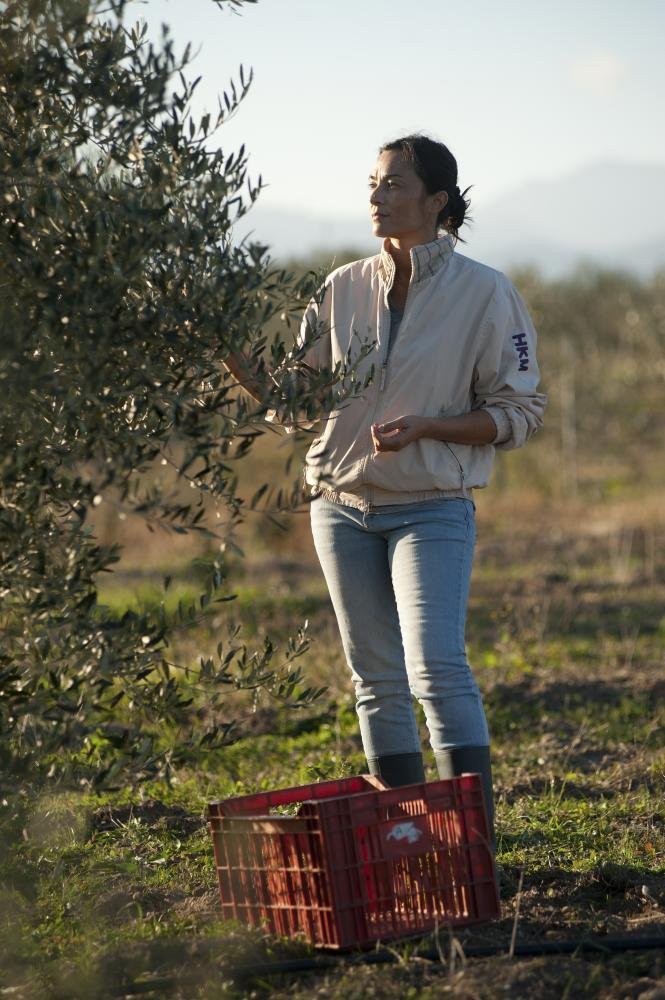 Emilie Borel-Berta is passionate about Mediterranean culture and olive growing. Originally from Corsica, Emilie has transformed 35 hectares of land into a thriving olive oil production business. With the help of Italian expert Ivo Berta, Emilie built a mill using state-of-the-art technology to produce olive oil of the highest quality. Through her hard work and dedication, Emilie has managed to cultivate olive trees on land that was once devoid of them. Today, her organic mill attracts visitors from all over the world and her olive oil is available through various delivery options. His love for the history and culture of Corsica is reflected in every bottle of his precious olive oil.
Emilie Borel-Berta is passionate about Mediterranean culture and olive growing. Originally from Corsica, Emilie has transformed 35 hectares of land into a thriving olive oil production business. With the help of Italian expert Ivo Berta, Emilie built a mill using state-of-the-art technology to produce olive oil of the highest quality. Through her hard work and dedication, Emilie has managed to cultivate olive trees on land that was once devoid of them. Today, her organic mill attracts visitors from all over the world and her olive oil is available through various delivery options. His love for the history and culture of Corsica is reflected in every bottle of his precious olive oil.
https://www.instagram.com/emilieborelberta
https://www.linkedin.com/in/emilie-borel-531a2815b/
4.4 María Lanagran
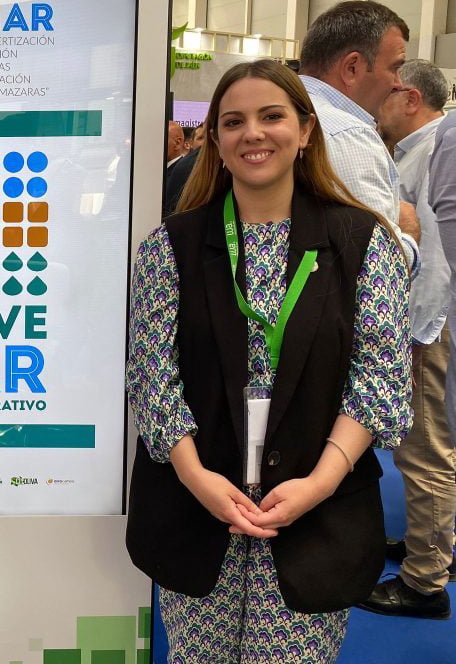
Maria Lanagran, daughter of ARTOLIO's renowned Extra Virgin Olive Oil (EVOO) producer Blas Lanagran, is a passionate and dedicated professional. As the new generation of the family production, Maria is determined to push the family business forward and give a more prominent role to women in the sector. Her academic background in chemistry and specialisation in elaiotechnology, combined with her role as a researcher in the area of food technology in the Department of Chemical, Environmental and Materials Engineering at the University of Jaén, positions her as a key figure in the advancement of the olive oil sector. Her dedication to the study of the quality and traceability of olive oil, and her focus on creating innovative strategies to improve its production, highlight her commitment to excellence and innovation. Maria Lanagran is undoubtedly an emerging leader in the olive oil industry.
https://www.linkedin.com/in/maria-lanagran-perea-8b7621180/
5. The Future of AgroInfluencers
The role of agroinfluencers in the agriculture sector is likely to grow in the future. As social media continues to evolve and expand, more individuals will have the opportunity to share their experiences and insights about agriculture and rural life.
Agroinfluencers will continue to play a crucial role in educating the public, advocating for sustainable practices, and promoting agricultural products. They will also continue to shape public opinion and influence consumer behavior in ways that benefit the agricultural sector.
Moreover, as the digital divide in rural areas continues to narrow, more farmers and agricultural professionals will have access to social media and the opportunity to become agroinfluencers. This will further diversify the voices and perspectives in the agricultural discourse, fostering a more inclusive and comprehensive understanding of agriculture and rural life.
The rise of agroinfluencers signifies a new era in agricultural communication. It reflects the growing recognition of the importance of agriculture and rural life in our society. It also highlights the power of social media in bridging the urban-rural divide and bringing agriculture closer to the public.
In conclusion, agroinfluencers are more than just social media personalities. They are advocates, educators, and change-makers in the agricultural sector. They are the emerging voices in the agricultural landscape, shaping public opinion, influencing consumer behavior, and driving positive change in agriculture and rural life.
Content created by:
Jesus F. Gordillo
Communication Manager of ARTOLIO ENI CBC MED
Strategic Director of Kellenföl Ad, an agency based in Barcelona. Advisor to companies and public institutions. Professor of marketing and advertising strategies.
I am a producer, can I join the ARTOLIO platform?
Welcome producers to the ARTOLIO platform: Registration as from 1 September 2023
Dear oil producers, we are pleased to announce that from 1 September 2023, you will be able to apply to join the innovative ARTOLIO platform. This platform is designed to address the needs of all oil producers, especially small producers looking to expand their reach and improve their productivity.
Who can apply?
The ARTOLIO platform is open to all small oil producers who wish to expand their horizons and become part of our growing community. No matter how small your production is, if you produce quality oil, we want you to be part of our platform.
How to apply?
To apply for registration on the ARTOLIO platform, a simple and easy to fill out form will be made available. This form will allow us to review each case and ensure that all our members comply with our high quality standards and sustainable production practices.
Benefits of joining ARTOLIO ENI CBC MED
Once you join our platform, you will become a member of the prestigious ARTOLIO ENI CBC MED community. This not only gives you significant recognition in the oil industry, but also access to a number of benefits.
As a member of ARTOLIO ENI CBC MED, they will have access to resources and opportunities to improve their production efficiency. You will also have the opportunity to connect with other producers, share experiences, learn from experts and participate in exclusive community events.
Join us
If you are an oil producer looking to grow and thrive in the competitive oil market, there is no better place to do it than at ARTOLIO.
We look forward to receiving your application from 1 September 2023. Together, we can do great things and take the art of oil production to new heights.
An alternative option towards Alzheimer's prevention: discover the story of Yannis Prodromou
INTERVIEWS
Yannis Prodromou
“We want to think of ourselves as modern farmers, because we collaborate and partake of scientific research, creating a breach between what is old and new in our sector. We want to participate in the lives of our clients and to reach out to as many people as possible.”
ARTOLIO is a project that strives to promote innovation, and so do the farmers who participate in it. Yannis Prodromou, Greek olive oil producer from the Thessaloniki region, is a fine example of what the will to adapt and change can do for one’s own business.
Yannis’ unique cultivating and harvesting process is the secret to the quality of his extra virgin olive oil. He only uses early harvest green olives for his products, collected in early September, when the olives are still lacking some of their oily contents, and hand-picked personally to ensure the product's high quality. There is also a minimal amount of fertilizers used in the cultivation process. This also ensures the olives keep some of their most beneficial properties, such as high contents of Omega-3, 9 and vitamin E.

However, in summer 2021, Yannis’ innovative ideas transcended from the cultivation process of his groves into the market thanks to the help of scientific research.
According to the Panhellenic Federation of Alzheimer Disease and Related Disorders, there are over 1 million cases of people affected by Alzheimer disease in Greece. Thus, Yannis wondered if the quality of our food or the diet we partake in could prevent or reduce the possibility of coming down with the disease.
After his participation in research with the Aristotle University of Thessaloniki, it was brought upon the attention of the public that some of the properties of high-quality extra virgin olive oil are a therapeutic strategy against the possibility of contracting Alzheimer, if combined with a healthy Mediterranean diet.
This is how the Micoil project was born.
Micoil is a natural product made of early harvest green olives of the Halkidiki variety specifically designed to be sold in pharmacies. At first, it was nothing but an idea, because if the product were to be sold the demand would exceed the capacity of what Yanni’s Olive Grove (Yannis Prodromou’s brand) could produce on its own.
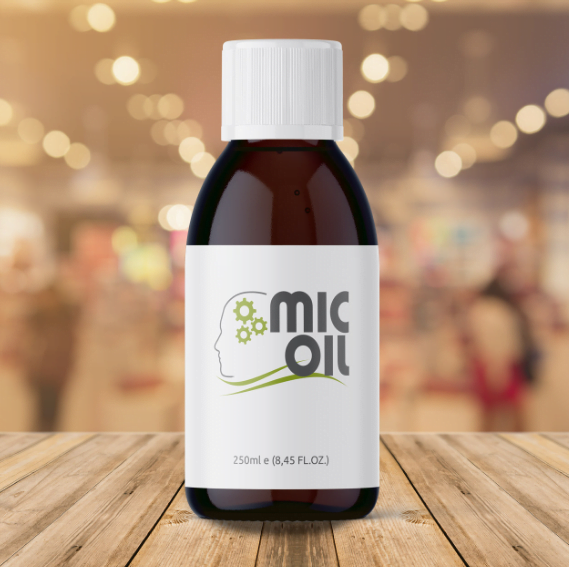
However, what first seemed to be an impossible feat started to become a possibility thanks partly to Yannis participation in the ARTOLIO project. Yannis needed to find more partners that could produce and supply high-quality extra virgin olive oil to double the production and meet the expectations of target customers, and the ARTOLIO global platform has given him and his brand an opportunity to contact other producers outside his region.
In Yannis’s own words; “We want to think of ourselves as modern farmers because we collaborate and partake of scientific research, creating a breach between what is old and new in our sector. We want to participate in the lives of our clients and to reach out to as many people as possible.”
Moreover, while the cultivation process is what ensures the quality of the product, Yannis faced some problems regarding the cost of production, since Halkidiki, the region Yannis originates from, lacks great water supplies for irrigation. Therefore, irrigation and fertilizing techniques were usually pricier, and thus the final product would turn out pricier than necessary. With this in mind, and knowing this was a hindrance to the success of his personal project, some funding from ARTOLIO went to the modernization of the cultivation process. “In a sense, Micoil exists thanks to the help provided by this project, because of its network and the possibility it offered for us to best our means.”
Yannis Prodromou participates as a beneficiary of the ARTOLIO project, funded by the European Union under the ENI program.
Blas Lanagrán, olive oil producer from Spain
INTERVIEWS
Blas Lanagrán
"ARTOLIO has opened the doors to us to the environmental protection of our olive grove"
The ARTOLIO project's main objective is to benefit its participants. It is a people-oriented project and it prides itself on providing the necessary help to the farmers who are part of it. Blas Lanagrán, the protagonist of this story, is one of the many participants who has witnessed the results of the project first-hand.
Blas's family consisted mainly of bakers. However, forty years ago, after inheriting a vast farmland located in the area of Jaén (region of Andalucía, south of Spain), his relatives decided to venture into the world of the olive tree. However, until now, Blas had not been able to sell his own olive oil. In addition, the irrigation system that was installed until the beginning of this year did not match the needs of the crop nor did it respect the needs of the environment. In other words, despite the prosperity of the olive harvest, Blas did not have the means to create a commercial brand nor develop his harvesting system towards one that was more respectful with the environment.
The olives used for her award-winning organic and extra virgin Consequently, the funds earmarked for Blas were invested in infrastructure and the guidance necessary to commercialize the oil. Thus, the project has opened the doors to the environmental protection of our olive grove with the implementation of an irrigation system with photovoltaic panels, which completely separates us from the fossil fuels that we were using and how much damage they are doing to the planet and to our environment”, assures Blas, after the installation of the new irrigation system.
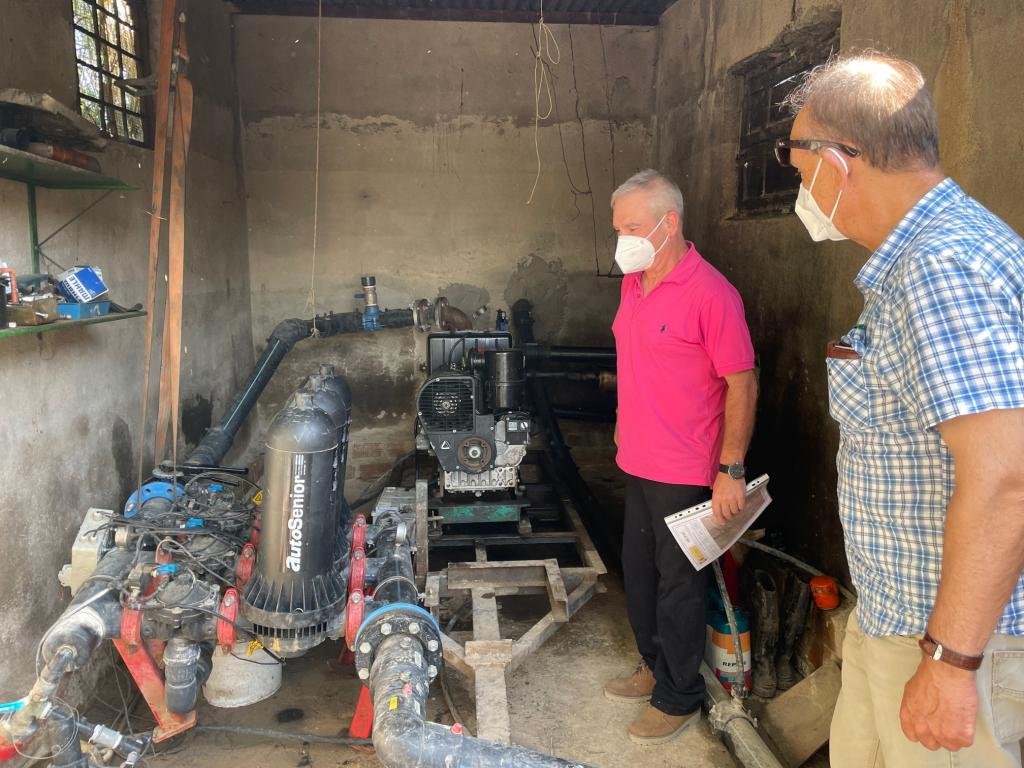
Thanks to the project, Blas now enjoys “something that we had in mind for many years and that we thought we would never achieve”: being able to market his own extra virgin olive oil and contribute to the environment with which he lives and works every day.
Hadas Lahav participates as a beneficiary of the ARTOLIO project, funded by the European Union under the ENI program.
ARTOLIO partner Salah Abu Eisheh, from Palestine: “The progress of ARTOLIO in supporting olive farmers is clear and significant”
INTERVIEWS
Salah Abu Eisheh
"The progress of ARTOLIO in supporting olive farmers is clear and significant"
The ARTOLIO team is made up of a great variety of participants, from different places, regions and customs. Therefore, the variety is not only in the olives with which the oil of our farmers is made, but also in the Mediterranean culture that is intrinsic to the project. Among the partners that make up the team, we also find this variety reflected, and they are all united by the same nexus: helping farmers attain good quality extra virgin olive oil within the frame of sustainability.
Salah Abu Eisheh, director of the Palestinian Center for Agricultural Research and Development (PCARD), is one of ARTOLIO's agricultural experts stationed in Palestine. There, Salah works side by side with the farmers and millers of the area to improve the quality of their extra virgin olive oil, reduce production costs, optimize the natural resources and support their local economy. He has also coordinated from the PCARD some events such as the participation of some farmers and millers from Palestine in the Jordanian Olive National Festival 2021, with the joint effort of the Israeli & Palestinian Olive Oil Council.
Salah joined the ARTOLIO project in the early stage of its concept development, through his connections in the PCARD, and gave the project designers a clear idea about the nature and characteristics of the olive oil sector in Palestine. This enabled them to open the discussion of "what they should do" to upgrade and develop the olive oil sector in Palestine, something much needed. Since the start of ARTOLIO, PCARD is effectively engaged in all its national and regional activities.
When asked about the progress made so far in his area, Salah comments that “The progress is clear and significant, farmers moved on from olive dry-farming to full-irrigation farming, they started filtering their oil for the first time because of ARTOLIO’s intervention and support. Considering producing high quality oil was the farmers’ priority, now they can concentrate on their other problems while striving to maintain that quality.” These problems, according to Salah, are still some concerns for the future of the project. More efforts should be put in the area of marketing. Farmers now can produce a very high quality olive oil and they know how to track the quality. However, they lack the means and connections to access a competitive market. Connecting producers with potential customers is the key for the ARTOLIO success.
10 ideas on how to give visibility to your olive oil
10 ideas on how to give visibility to your olive oil
Diving into the world of olive oil can be an exciting and rewarding adventure, but with so many brands and varieties on the market, it can be difficult to differentiate the product and make it stand out. We have compiled a list of 10 basic ideas to increase the visibility of your olive oil. Let's embark on this tasty journey and discover the secrets to unlocking the full potential of your product and making it the preferred choice of both enthusiasts and casual consumers.

- Story and quality: Share the story behind your olive oil, highlighting the tradition and quality of the ingredients used. This helps to establish an emotional connection with customers and highlight the authenticity of the product.
- Live demonstrations: Organize live demonstrations, such as oil tastings or cooking workshops, to show customers how to use your olive oil in different recipes and the advantages of its flavor.
- Collaborations with local chefs: Collaborate with local chefs to create exclusive recipes with your product. This can increase the visibility of the product and demonstrate its versatility in the kitchen.
- Social networks: Use social networks to promote your olive oil, sharing recipes, pictures and testimonials from satisfied customers. This can increase exposure and make your product more interesting to the public.
- Participation in fairs and events: Attend local fairs and events related to agriculture and food, where you can present your oil and publicize its benefits.
- Attractive labeling and packaging: Design eye-catching labels and packaging that stand out on store shelves and attract customers.
- Promotions and discounts: Offer special promotions and discounts on your oil, such as introductory offers, volume discounts or coupons.
- Partnerships with stores and restaurants: Establish partnerships with local stores and restaurants to sell and use your olive oil in their recipes. This can increase product demand and visibility.
- Social and environmental responsibility: Emphasize sustainable and ethical production practices, such as using local ingredients, recycling packaging or minimizing waste. This can attract customers concerned about the environment and social responsibility.
- Loyalty program: Implement a loyalty program to reward frequent customers with discounts, gifts or exclusive promotions. This will build customer loyalty and encourage repeat purchases.
Content created by:
Jesus F. Gordillo
Communication Manager of ARTOLIO ENI CBC MED
Strategic Director of Kellenföl Ad, an agency based in Barcelona. Advisor to companies and public institutions. Professor of marketing and advertising strategies.
Unlocking engagement success: a complete guide to creating appealing social media content.
Unlocking engagement success: a complete guide to creating appealing social media content.
Introduction to the development of attractive content for social networks
Creating engaging content for social media is critical to any digital marketing strategy. Millions of people use these platforms daily. This is why it is essential to learn how to create social media content that attracts your audience and generates engagement. In this article, we will explore the importance of social media engagement and provide you with a comprehensive guide to developing engaging content.
Understanding engagement and its importance in social networks.
Engagement is the interaction that takes place between users of a social media platform and the content they share. This may include “likes”, comments, sharing and other types of interactions. The higher the engagement, the more likely your content will be distributed across the platform and reach more people.
Engagement is important in social media because it helps increase your brand visibility, foster strong relationships with your followers and drive traffic to your website. A high level of engagement can also improve your online reputation and generate more business opportunities.

How to create content for social networks: a brief description
There are several strategies and approaches you can use to create engaging content on social networks. Some of these include:
- Share relevant and valuable content that resonates with your audience
- Use high-quality images and videos to capture the users' attention
- Publish updates about the industry and news to keep your audience informed
- Participate in online conversations and discussions to encourage interaction and engagement
- Use relevant hashtags and keywords to increase the visibility of your content
In the following sections, we will explore these approaches in detail and provide you with an 8-step process to generate engagement on social media platforms.
8 steps to generate engagement on social media platforms
By following these 8 steps, you will be able to create interesting content that will bring forth engagement on social networks and increase your brand's visibility.
- Define objectives and goals: Before you start creating content, it is important to set clear objectives and goals for your social media strategy. These may include increasing brand visibility, driving traffic to your website or generating sales. Having specific objectives will help you create content that is aligned with your goals and measure your success.
- Know your audience: To create content that resonates with your audience, you must know their interests, needs and preferences. Research and analyze your audience to understand their behaviors, demographics and content consumption habits. This will allow you to create content that is relevant and valuable to them.
- Create a content calendar: A content calendar is a planning tool that helps you organize and schedule your social media posts. By creating a content calendar, you can ensure that your content is evenly distributed and published at optimal times to increase engagement.
- Produce quality content: The quality of the content you share on social networks is fundamental to creating engagement. Make sure your content is relevant, valuable and visually appealing. Use high-quality images and videos, write engaging copy, and use a tone and writing style that resonates with your audience.
- Optimize your content for each platform: Each social media platform has its own characteristics and best practices. Tailor your content for each platform by making sure it fits the right formats and dimensions, and use relevant hashtags and keywords to increase your visibility.
- Encourage interaction and engagement: To generate engagement on social networks, you must be willing to interact with your audience and encourage online conversations. Respond to comments and questions from your followers, engage in debates and discussions, and share user-generated content to strengthen relationships with your audience.
- Monitor and measure the success of your content: Use analytics tools to monitor the performance of your content on social networks and evaluate the success of your strategy. Pay attention to engagement metrics such as “likes”; comments, shares and clicks, and use this data to improve your content and adjust your strategy accordingly.
- Refine and improve your strategy: Based on the data and feedback you collect, refine and improve your social media content strategy. Make sure you are always aware of trends and changes in social media platforms and adapt your approach accordingly.
How to develop content for different social media platforms
Each social media platform has its own characteristics, formats and best practices. Here are some tips for developing engaging content and generating engagement on the major platforms:
- Use high-quality images and videos to capture users' attention.
- Share links to articles and blog posts relevant to your audience.
- Use a conversational and friendly writing tone.
- Ask questions and encourage followers to share their opinions and experiences.
- Take advantage of Facebook's interactive features, such as polls and live broadcasts.
- Share visually appealing, high-quality images and videos.
- Use relevant hashtags to increase the visibility of your content.
- Share Instagram stories to provide a more personal and authentic view of your brand.
- Collaborate with influencers and other related accounts to increase your reach and engagement.
- Take advantage of Instagram's interactive features, such as question stickers and custom filters.
- Share industry updates and news to keep your audience informed.
- Use a concise and direct writing tone.
- Participate in online conversations and discussions using relevant hashtags.
- Respond to your followers' mentions and questions to encourage interaction and engagement.
- Share user-generated content and retweet other users' posts related to your brand.
- Share professional, industry-oriented content such as articles, case studies and blog posts.
- Use a more formal and professional writing tone.
- Participate in discussion groups and forums related to your industry.
- Share company updates and achievements to highlight your brand's culture and values.
- Leverage LinkedIn's publishing features to share long-form content and generate engagement.
Tips and tricks for maintaining a consistent brand voice
Maintaining a consistent brand voice on social media is essential to generating engagement and building a strong brand identity. Here are some tips and tricks to achieve this:
- Establish style guidelines: Create style guidelines that include details about your writing tone, use of keywords and phrases, and content formatting. These guidelines will help ensure that your content is consistent and aligned with your brand's personality.
- Tailor your voice to each platform: While it's important to maintain a consistent brand voice, you should also adapt your tone and writing style to each social media platform. For example, you can adopt a more informal and friendly tone on Facebook, while on LinkedIn, you may want to use a more formal and professional tone.
- Train your team: Make sure everyone on your team is familiar with your brand's style guidelines and knows how to apply them to social media content. Provide training and feedback to ensure your team is aligned with your brand voice and style.
- Use collaboration tools: Use collaboration tools, such as Trello or Asana, to share and review content on social networks before publishing it. This will ensure that your content is consistent and aligned with your brand voice.
- Monitor and adjust your brand voice: Be aware of feedback from your audience and use this data to adjust and improve your brand voice on social media. Always be willing to adapt and evolve according to the needs and preferences of your audience.
Using analytics to measure and optimize the success of your content
Social media analytics is essential to measure the success of your content and optimize your strategy. Here are some key metrics to monitor:
- Reach: The number of people who see your content on social networks.
- Impressions: The number of times your content is shown on social networks, regardless of whether it is clicked on or not.
- Engagement: The number of interactions your content receives, including likes, comments and shares.
- Clicks: The number of times users click on links or interactive elements in your content.
- Conversions: The number of users who take a specific action after interacting with your content, such as subscribing to your newsletter or making a purchase.
Use analytics tools, such as Google Analytics and native social media analytics platforms, to monitor these metrics and evaluate the success of your content strategy. Use this data to adjust and improve your approach and optimize the performance of your social media content.
Examples of successful content and engagement strategies in social networks.
There are numerous examples of brands that have achieved great success on social media through effective content and engagement strategies. Some of these include:
- Nike: Nike uses high-quality images and videos in its social media posts to capture the attention of its audience. They also leverage the power of influencers and sponsored athletes to increase their reach and generate engagement.
- Coca-Cola: Coca-Cola has adopted a conversational and friendly writing tone in their social networks, which allows them to interact effectively with their audience. They also focus on sharing user-generated content and fostering online conversations about their brand.
- Airbnb: Airbnb uses social media to tell stories about their hosts and guests, allowing them to showcase their brand in an authentic and personal way. They also actively participate in online conversations and respond quickly to questions and comments from their followers.
Study these and other successful examples to get ideas and inspiration for your own social media content strategy.
Tools and resources to simplify the management of your social networks
In addition to analytics tools, there are numerous tools and resources you can use to simplify the management and optimization of your social networks. These include scheduling tools, such as Hootsuite and Sprout Social, that allow you to schedule posts on multiple platforms at the same time. You can also find free content templates, step-by-step guides for creating engaging content and tools for measuring performance.
Research these resources and find the ones that best suit your needs. Set a budget for the management of your social networks and find the best way to achieve your business objectives. Make sure your strategy is in line with your business objectives and scalable as your online presence grows. Finally, maintain constant communication with your audience and continue to optimize your efforts to ensure the best possible performance.
Content created by:
Jesus F. Gordillo
Communication Manager of ARTOLIO ENI CBC MED
Strategic Director of Kellenföl Ad, an agency based in Barcelona. Advisor to companies and public institutions. Professor of marketing and advertising strategies.
Unleashing the power of agricultural marketing: Essential strategies for modern farmers.
Unleashing the power of agricultural marketing: Essential strategies for modern farmers.
Introduction to agricultural marketing
Agricultural marketing, also known as agromarketing, is a crucial component to the success of any farmer's brand nowadays. Globalization and increasing competition in the agricultural sector have made marketing an essential element in building and maintaining a strong customer base and ensuring the sustainability of an agricultural business. Agromarketing is a holistic approach that includes the planning, implementation and control of all activities related to the promotion, sale and distribution of agricultural products.
Agriculture has undergone a significant transformation in recent decades, and technological advances have changed the way farmers produce, process and market their products. Agromarketing is a powerful tool that helps farmers adapt to these new realities and make the most of market opportunities. In this article, we will discuss the essential strategies that modern farmers should embrace to take full advantage of the power of agricultural marketing.
The importance of agromarketing in modern agriculture
Nowadays, agromarketing is critical to the success of any agribusiness. Increasing competition and the growing demand for high-quality agricultural products make marketing more important than ever. Growers must be aware of market trends, consumer needs and wants, and the practices of their competitors to stay on top of the industry and maintain a competitive advantage.
Agromarketing is also important to ensure the sustainability of an agricultural business. Farmers who adopt effective marketing practices can establish strong and lasting relationships with their customers and other key players in the supply chain. This allows them to maintain a steady revenue stream and ensure the long-term financial viability of their businesses.
In addition, agromarketing helps farmers communicate the value of their products to consumers. This is especially relevant in a world where consumers are increasingly concerned about the quality, safety, and sustainability of the agricultural products they buy. Farmers who can effectively communicate their ethical and sustainable practices and the quality of their products have a competitive advantage in the marketplace and can obtain higher prices for their products.
 Key principles of agricultural marketing
Key principles of agricultural marketing
Agricultural marketing is a holistic approach that involves several key principles that farmers should keep in mind when developing and implementing their marketing strategies. These principles include:
- Customer orientation: Farmers should focus on meeting the needs and desires of their customers, and adapt their products and practices accordingly. This involves researching and understanding customer preferences and tailoring the products and services offered to meet those preferences.
- Market segmentation: Farmers must identify and target specific market segments that are more likely to buy their products. This involves analyzing the market based on demographic, geographic, psychographic and behavioral factors and developing products and marketing strategies that fit the needs and desires of each segment.
- Differentiation and positioning: Farmers must differentiate their products and services from those of their competitors and position them uniquely in the customer's mind. This involves effectively communicating the benefits and unique features of the products and services offered, and establishing a strong and consistent brand image.
- Marketing mix: Farmers must employ an appropriate mix of the four “P 's” of marketing (product, price, promotion and place) to achieve their marketing objectives. This involves making decisions about product quality and features, pricing strategy, promotional tactics and the distribution channels to be used.
Understanding the market and the target audience
To develop an effective agricultural marketing strategy, farmers must first understand the market in which they operate and the target audience they are addressing. It involves researching and analyzing market trends, consumer needs and wants, and the practices of your competitors. Growers can obtain valuable market and target audience information through a variety of sources, such as market research reports, case studies, competitor analysis, and interviews with customers and industry experts.
By understanding the market and the target audience, farmers can identify opportunities and challenges that they can leverage to improve their operations and better position themselves in the market. They can also tailor their products and services to meet the needs and desires of consumers and differentiate themselves from their competitors.
Developing an effective agromarketing strategy
Once farmers have researched and understood the market and target audience, they can begin to develop an effective farm marketing strategy. This strategy should include clear and specific marketing objectives, as well as specific tactics and actions to achieve those objectives. Examples of agricultural marketing objectives may include increasing brand awareness, increasing sales, improving customer loyalty or entering new markets.
When developing an agromarketing strategy, farmers should consider the key agricultural marketing principles mentioned above, such as customer focus, market segmentation, differentiation and positioning, and marketing mix. They must also take into account external factors, such as economic conditions, market trends and government regulations, which may affect their business and marketing operations.
Using digital platforms for agricultural marketing
Digital platforms have changed the way farmers market their products and connect with their customers. Farmers can leverage a variety of digital platforms to reach their target audience effectively and efficiently. Some examples of digital platforms that farmers can use for agricultural marketing include:
- Websites and blogs: Farmers can create websites and blogs to share information about their products, farming practices and the latest news about the industry. This allows them to establish an online presence and increase their visibility in the market.
- Social media: Farmers can use social media platforms such as Facebook, Instagram, Twitter, and LinkedIn to connect with their customers, share relevant and engaging content and promote their products and services.
- E-commerce: Farmers can use e-commerce platforms to sell their products directly to consumers, allowing them to reach a wider audience and increase their income.
- Email marketing: Farmers can use email marketing to keep in touch with their customers and send them information about promotions, events and relevant news.
- Online advertising: Farmers can use online advertising, such as Google AdWords or Facebook Ads, to reach a specific target audience and promote their products and services.
Agromarketing tools and channels
In addition to digital platforms, farmers can also employ a variety of traditional marketing tools and channels to promote their products and services. Examples of agromarketing tools and channels include:
- Agricultural fairs and exhibitions: Farmers can participate in agricultural fairs and exhibitions to showcase their products and connect with customers and other key players in the industry.
- Public relations and press releases: Farmers can use public relations and press releases to communicate important news and information about their products and farming practices to the media and the public.
- Printed promotional materials: Farmers can use printed promotional materials, such as brochures, catalogs and business cards, to share information about their products and services with customers and prospects.
- Traditional media advertising: Farmers can use traditional media advertising, such as newspaper, magazine, radio and television advertisements, to reach a wider audience and promote their products and services.
Building long-term relationships with customers and stakeholders
Building long-term relationships with customers and other key players in the supply chain is essential to the success of any agricultural business. Farmers who are able to establish strong and lasting relationships with their customers and partners are more likely to maintain a steady stream of income and ensure the long-term financial viability of their businesses.
To build long-term relationships, growers must focus on customer satisfaction and providing exceptional customer service. This involves listening and responding to customers' needs and desires, solving problems quickly and effectively, and communicating openly and transparently with customers. Farmers can also use customer loyalty programs and offer incentives for repeat purchases, such as discounts and special offers.
In addition to customers, farmers must also establish strong relationships with other key players in the supply chain, such as suppliers, distributors and regulators. This involves establishing trusting and collaborative relationships and working together to improve the quality and efficiency of supply chain operations.
Measuring agromarketing success
It is important for farmers to measure and evaluate the success of their farm marketing efforts to determine which strategies and tactics are working and which areas need improvement. Some metrics that farmers can use to measure agromarketing success include:
- Return on Investment (ROI): Farmers can calculate their ROI to evaluate the effectiveness of their marketing efforts and determine if they are getting an adequate return on their investment.
- Conversion rate: Farmers can measure the conversion rate of potential customers to actual customers to determine the effectiveness of their marketing tactics.
- Online engagement: Farmers can measure online engagement, such as the number of social media followers and website traffic, to evaluate the effectiveness of their online marketing efforts.
- Customer satisfaction surveys: Farmers can conduct customer satisfaction surveys to assess customer satisfaction and determine areas for improvement.
The best resources for agricultural marketing education and training
There is a wide variety of resources and training programs available for farmers looking to strengthen their agricultural marketing skills and knowledge. Some of the best resources
Content created by:
Jesus F. Gordillo
Communication Manager of ARTOLIO ENI CBC MED
Strategic Director of Kellenföl Ad, an agency based in Barcelona. Advisor to companies and public institutions. Professor of marketing and advertising strategies.
